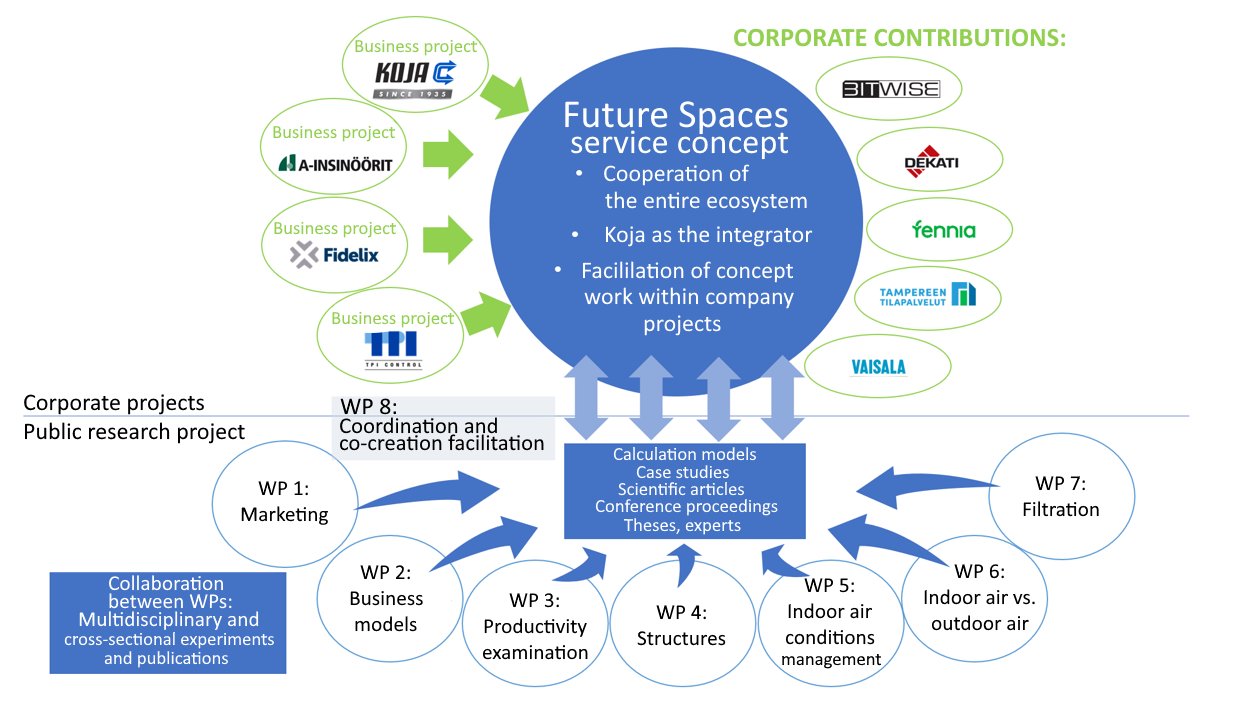Plenty of indoor air problems are found nowadays in service and office buildings. The most significant causes for these problems are microbes and their metabolic products, particles, fibres, radon, VOC, carbon dioxide, flue gases and dust. These harmful substances originate from the outdoor air, the structures of the building, the soil, the ventilation system and the users. All this will lead to indoor air problems, which in turn will lead to increased amounts of absence due to sickness and a decrease in working ability and quality of life. Additionally, an abundance of costs and inconveniences will be caused for the users by the renovation and demolition of the buildings, as well as the temporary facility solutions.
The aim of the Future Spaces -project is to find a solution to these problems by developing a service concept for the renovation and condition control of service and office buildings, which will take into account the age of the building, the regulations and instructions, the air tightness of the building and prevailing pressure differences, construction materials and their behaviour, the effect of adding insulation, thermal comfort factors, as well as climate change and the effects of outdoor air pollutants.
The service concept consists of a novel business model, research related to the physical factors and the indoor air conditions of the buildings, and finally the application of the overall solution on the buildings that are to be renovated.
The higher quality in controlling the indoor air conditions of renovated buildings offers an opportunity for extensive international business. The business focuses on finding a more efficient and more straightforward way to carry out renovation projects, which is meant to benefit the owners and users of those properties that already require renovation.
Several property owners and users already contract out the management of conditions and building maintenance technology. This, combined with the globally ageing real estate mass, offers a significant market segment.
This problem is too large for one party to handle alone. To solve this challenge, a consortium divided into roles, aka an ecosystem, is formed out of companies and research institutions with a high level of competence. Later other parties are also included.
The service concept is developed through several central steps. Business models suitable for the concept are researched and developed during the project. The methods of construction, construction principles, building regulations and codes, as wells as the construction materials used in buildings typical for different eras in the countries surrounding the Baltic Sea are investigated with the international partners. The moisture performance of key envelope structures is studied theoretically and experimentally while considering the effects of climate change, addition of insulation and overpressure. The indoor conditions of service and office buildings are studied through extensive testing done in the buildings. The indoor conditions are also improved through the technological development of building maintenance technology and control technology. The controlling of conditions is developed to be optimal when considering the age and use of the building. Additionally, the research results are used to develop the condition assessment procedure and renovation instructions of buildings.

The advantages of the developed service concept are its ability to take into account the era the property was built in, the environmental factors and climate change. The concept enhances the condition of the building, its indoor air conditions, moisture safety, energy efficiency, CO2 emissions and the value of the property.
The concept is investment free for the customer, and directly affects people’s health and working ability. The concept is meant to provide a competitive factor for the ecosystem using the concept, as well as a service innovation for the international market.
The project lasts from 1.9.2020 till 31.8.2022. The project is carried out by three research groups from Tampere University (Building Physics, Aerosol Physics, Information and Knowledge Management) and by Technical Research Centre of Finland (VTT), as well as a large group of companies, international universities and research institutions. The responsible leader of the project and the coordinator of the research portion is Professor Juha Vinha (Building Physics) and the project manager is Doctoral Student Petteri Huttunen (Building Physics). The responsible persons from the Aerosol Physics research group are Assoc. Prof. Topi Rönkkö and Doctor of Science Panu Karjalainen. The responsible persons from the Information and Knowledge Management research group are Prof. Hannu Kärkkäinen and Doctoral Student Karan Menon. The responsible leader for VTT’s portion is Vice President Tuula Mäkinen and the project manager is Hannu Salmela. The coordinator of the whole project is Jari Erkkilä from Tamlink Innovation-Research-Development Ltd. The overall funding for the research portion is c. 1,8 M€ and the funding for the whole project, including companies’ own product development projects, is c. 3,7 M€. The project is financed by Business Finland, Tampere University and VTT as well as the companies included in the project. The project is a part of the activity of Business Finland’s growth engine IAQe (Indoor Air Quality ecosystem).
The project’s own website can be found at www.futurespace.fi.
More information:
Professor Juha Vinha, Building Physics, Tampere University
juha.vinha@tuni.fi, tel. 040-8490296
COO Jari Erkkilä, Tamlink Innovation-Research-Development Ltd
jari.erkkila@tamlink.fi, tel. 040-5136917

